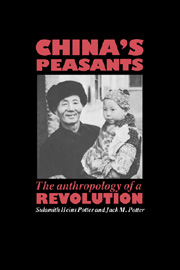Book contents
- Frontmatter
- Contents
- List of illustrations
- List of tables
- Preface
- Notes on the text
- Map 1 China
- 1 The old “feudal” order: Zengbu before Liberation
- 2 Establishing the new order
- 3 The ordeal of collectivization
- 4 The Cultural Revolution
- 5 Maoist society: the production team
- 6 Maoist society: the brigade
- 7 Maoist society: the commune
- 8 Impatient aspirations: transition to the post-Mao period
- 9 The cultural construction of emotion in rural Chinese social life
- 10 Marriage, household, and family form
- 11 Chinese birth planning: a cultural account
- 12 Lineage and collective: structure and praxis
- 13 Party organization
- 14 The party ethic: a devotion born of distress and enthusiasm
- 15 A caste-like system of social stratification: the position of peasants in modern China's social order
- 16 The Chinese peasants and the world capitalist system
- 17 The crystallization of post-Mao society: Zengbu in 1985
- References
- Index
14 - The party ethic: a devotion born of distress and enthusiasm
Published online by Cambridge University Press: 02 December 2009
- Frontmatter
- Contents
- List of illustrations
- List of tables
- Preface
- Notes on the text
- Map 1 China
- 1 The old “feudal” order: Zengbu before Liberation
- 2 Establishing the new order
- 3 The ordeal of collectivization
- 4 The Cultural Revolution
- 5 Maoist society: the production team
- 6 Maoist society: the brigade
- 7 Maoist society: the commune
- 8 Impatient aspirations: transition to the post-Mao period
- 9 The cultural construction of emotion in rural Chinese social life
- 10 Marriage, household, and family form
- 11 Chinese birth planning: a cultural account
- 12 Lineage and collective: structure and praxis
- 13 Party organization
- 14 The party ethic: a devotion born of distress and enthusiasm
- 15 A caste-like system of social stratification: the position of peasants in modern China's social order
- 16 The Chinese peasants and the world capitalist system
- 17 The crystallization of post-Mao society: Zengbu in 1985
- References
- Index
Summary
Every complex civilization includes several social strata, each with its own material interests, its own kind of power, its own world view, and its own concept of status honor (see Weber 1951, 1952, 1958). And there tends to be one dominant stratum – the brahmins of India, the aristocracy of Medieval Europe, the business class of the United States – whose cultural influence is so great as to shape the character of its civilization. These dominant strata enact and exemplify not merely material interests but also ideal interests, embodied in the great world religions, of which they are the most powerful exponents (see Bendix 1962, pp. 257–281).
In the great peasant-based societies, local rural representatives of these dominant strata govern the peasant masses on behalf of the elite. The local brahmins and other upper castes who dominate village India, the clergy and minor nobility of Medieval Europe, and the traditional Chinese gentry are examples of such groups. These local elites are, in Eric Wolf's (1956) terms, “cultural brokers,” hinge groups forming the connection between the peasant masses on the one hand, and the urban elites and the state on the other. They transmit elements of their civilization's literate Great Tradition (Redfield 1967, p. 26) from the urban elites to the peasants, and they are political brokers, who transmit and interpret state policy to the peasants. They are Janus-faced, in the sense of “looking both toward the requirements imposed by the larger political and economic order and toward the customary expectations of the peasant community” (Diaz and Potter 1967, p. 164).
- Type
- Chapter
- Information
- China's PeasantsThe Anthropology of a Revolution, pp. 283 - 295Publisher: Cambridge University PressPrint publication year: 1990



